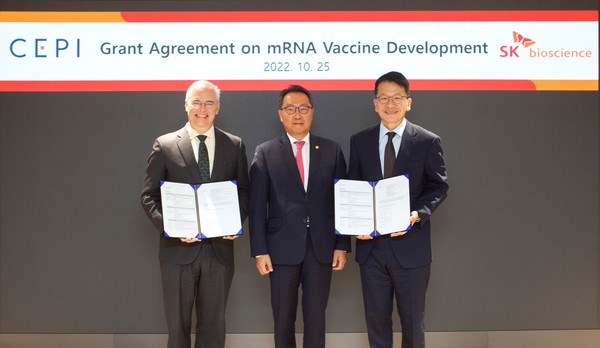SK Bioscience plans to work with Coalition for Epidemic Preparedness Innovations (CEPI) to secure mRNA vaccine platform technology to quickly respond to infectious diseases and use it to secure a diverse vaccine portfolio.

To respond to Disease X swiftly and solve the problem of vaccine supply imbalance in low- and middle-income countries, CEPI is currently holding a bid for a project related to developing RNA vaccine platform technologies and a vaccine library against emerging and endemic infectious diseases.
Disease X is a placeholder name adopted by the World Health Organization (WHO) to represent a hypothetical, unknown pathogen that could cause a future epidemic,
SK Bioscience was chosen as the first company to participate in the project.
Under the partnership, CEPI will provide up to $140 million (200 billion won) in research grants, and SK Bioscience will use the grant to develop an mRNA vaccine for the Japanese encephalitis virus and Lassa fever virus.
SK Bioscience will initially receive $40 million from CEPI to conduct phase 1 and 2 clinical trials of two mRNA vaccine platform projects. Pending results from the two studies, CEPI could provide an additional $100 million in funding to support late-stage trials to validate the mRNA platform further.
SK bioscience and CEPI also agreed to expand cooperation on developing various vaccines based on the mRNA platform to respond to the spread of infectious diseases in low- and middle-income countries.
"We are racing against the clock now, because we don't know when the next pandemic virus will emerge," CEPI CEO Richard Hatchett said. "Key to making a future free of pandemics a reality is the ability to rapidly respond to the next Disease X with new vaccines and other countermeasures in just 100 days."
CEPI's expanded partnership with SK bioscience will help kick start the world's efforts to validate these mRNA platform technologies so that they can be used to create a library of vaccines ready for use against the next Disease X and prepare the world for the next pandemic, Hatchett added.
SK Bioscience's deal with CEPI follows a recent price hike in SK Bioscience's shares after Pfizer announced its plans to increase its Covid-19 vaccine price in the U.S.
Pfizer revealed during an investor call on Monday that it is considering charging a private-market price between $110 and $130 per dose for Comirnaty, its Covid-19 vaccine, which is four times higher than the current $30 price tag.
In contrast, an SK Bioscience official said that the company is currently not discussing a price hike for its vaccine.
"If the World Health Organization (WHO) and other approvals are granted, we expect exports to low- and middle-income countries will become more active," a company official said to Korea Biomedical Review.
According to a local analyst, if the Covid-19 resurgence becomes a reality and Pfizer increases its vaccine price, SK Bioscience's vaccine may become more competitive.
"However, it is still questionable whether Pfizer's price hike will end the long-term price fall of SK Bioscience's stock price," said Lee Jun-soo, an analyst for Prophet Asset Management.
SK Bioscience's shares have currently fallen 11 percent in the past month.
"This is because there are concerns about a decrease in earnings as the product portfolio of SK Bioscience is centered on Covid-19 vaccines to the extent that almost all of the company's sales are coming from products and services related to the virus," Lee said.
According to SK Bioscience's first half sales report, sales of products generated from Covid-19 vaccines was 23.6 billion won, accounting for 10 percent of the total sales, and service sales generated from contract manufacturing organization (CMO) of Covid-19 vaccines, was 18.7 billion won, accounting for 88 percent of the total sales.

